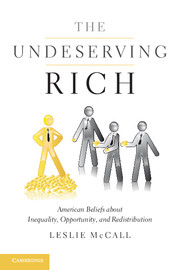Book contents
- Frontmatter
- Contents
- Tables and Figures
- Preface and Acknowledgments
- Introduction: Thinking about Income Inequality
- 1 Beyond the Opposition between Opportunity and Inequality
- 2 The Emergence of a New Social Issue
- 3 American Beliefs about Income Inequality
- 4 Why Do Americans Care about Income Inequality?
- 5 Americans' Social Policy Preferences in the Era of Rising Inequality
- Conclusion: A New Era of Beliefs about Inequality
- Notes
- References
- Index
Introduction: Thinking about Income Inequality
Published online by Cambridge University Press: 05 April 2013
- Frontmatter
- Contents
- Tables and Figures
- Preface and Acknowledgments
- Introduction: Thinking about Income Inequality
- 1 Beyond the Opposition between Opportunity and Inequality
- 2 The Emergence of a New Social Issue
- 3 American Beliefs about Income Inequality
- 4 Why Do Americans Care about Income Inequality?
- 5 Americans' Social Policy Preferences in the Era of Rising Inequality
- Conclusion: A New Era of Beliefs about Inequality
- Notes
- References
- Index
Summary
In the past decade, one sensational event after another has been connected in some way to rising economic inequality. Most recently, the Occupy Wall Street movement catapulted the issue into our living rooms. Not only did the protesters demand greater economic and social equality for the bottom ninety-nine against the top one “percenters,” but they coined a new set of class categories in the process and dramatically altered the focus of the 2012 Presidential campaign. Almost a decade ago, when I began research on American beliefs about rising inequality, the scandals surrounding Enron were making front-page news, with the pension funds of workers and retirees evaporating into thin air as the coffers of executives mysteriously survived.
In between Enron and Occupy Wall Street, there is no shortage of occasions to reflect on the state of income inequality in the United States – the Bush tax cuts of 2001 and 2003, the outsourcing of middle-class jobs to Ireland and India in 2004, Hurricane Katrina in 2005, the Great Recession in 2007, and the financial crisis in 2008. At each turn in the road, reporters and commentators concerned about rising income inequality but dismayed by the lack of political attention given to the issue declared that finally it would be taken seriously. And this says nothing of the events prior to the 2000s, several of which pointed the finger at rising inequality just as vehemently, as I show in Chapter 2 in my analysis of media coverage.
- Type
- Chapter
- Information
- The Undeserving RichAmerican Beliefs about Inequality, Opportunity, and Redistribution, pp. 1 - 20Publisher: Cambridge University PressPrint publication year: 2013



